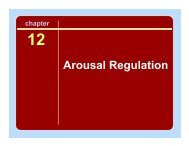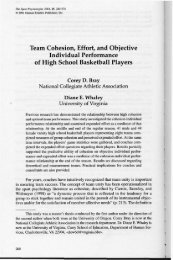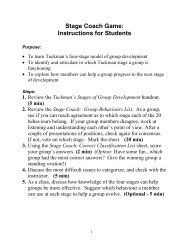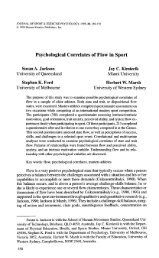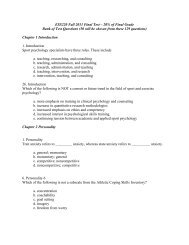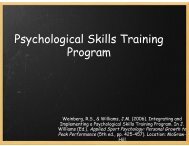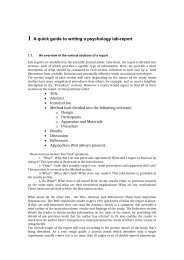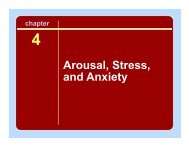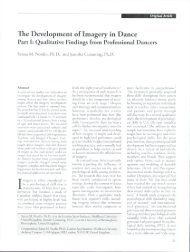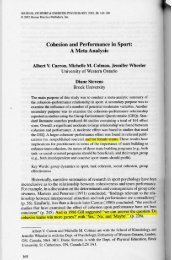Sport and Exercise Psychology Review - Sport Psychology Goes to ...
Sport and Exercise Psychology Review - Sport Psychology Goes to ...
Sport and Exercise Psychology Review - Sport Psychology Goes to ...
You also want an ePaper? Increase the reach of your titles
YUMPU automatically turns print PDFs into web optimized ePapers that Google loves.
Mark B. Andersen<br />
ogy graduate students in<strong>to</strong> our programme,<br />
we start them off with many warnings about<br />
venturing in<strong>to</strong> this field. One point we<br />
emphasise is that there are many people out<br />
there calling themselves sport psychologists,<br />
or mental coaches, or performance counsellors<br />
who practice unethically <strong>and</strong> leave trails<br />
of alienation behind them. Charlatans,<br />
quacks <strong>and</strong> really needy people abound.<br />
They tarnish the field <strong>and</strong> make it difficult<br />
for those who practice ethically. Our reputation<br />
as a helping profession is constantly<br />
threatened, <strong>and</strong> every semester some new<br />
examples of ethical turpitude crop up <strong>to</strong><br />
References<br />
American Psychological Association. (2002). Ethical<br />
principles of psychologists <strong>and</strong> code of conduct.<br />
Washing<strong>to</strong>n, DC: Author (available from http://<br />
www.apa.org/ethics/).<br />
Andersen, M.B. (1994). Ethical considerations in the<br />
supervision of applied sport psychology graduate<br />
students. Journal of Applied <strong>Sport</strong> <strong>Psychology</strong>, 6,<br />
152–167.<br />
Andersen, M.B. (2004). The evolution of training <strong>and</strong><br />
supervision in sport psychology. In T. Morris &<br />
J.J. Summers (Eds.), <strong>Sport</strong> psychology: Theory, applications<br />
<strong>and</strong> issues (2nd ed., pp. 452–469). Brisbane,<br />
Australia: Wiley.<br />
Andersen, M.B. (2005). Touching taboos: Sex <strong>and</strong><br />
the sport psychologist. In M.B. Andersen (Ed.),<br />
<strong>Sport</strong> psychology in practice (pp. 171–191). Champaign,<br />
IL: Human Kinetics.<br />
Andersen, M.B., & Brewer, B.W. (1995). Organizational<br />
<strong>and</strong> psychological consultation in collegiate<br />
sports medicine groups. Journal of American<br />
College Health, 44, 63–69.<br />
Andersen, M.B., Van Raalte, J.L. & Brewer, B.W.<br />
(2000). When applied sport psychology graduate<br />
students are impaired: Ethical <strong>and</strong> legal issues in<br />
supervision. Journal of Applied <strong>Sport</strong> <strong>Psychology</strong>, 12,<br />
134–149.<br />
Andersen, M.B., Van Raalte, J.L. & Brewer, B.W.<br />
(2001). <strong>Sport</strong> psychology service delivery: Staying<br />
ethical while keeping loose. Professional <strong>Psychology</strong>:<br />
Research <strong>and</strong> Practice, 32, 12–18.<br />
British Psychological Society. (1993). A Code of<br />
Conduct for Psychologists. London: BPS (available<br />
at: http://www.bps.org.uk/the-society/<br />
ethics-rules-charter-code-of-conduct/code-ofconduct/a-code-of-conduct-for-psychologists.<br />
cfm).<br />
Cogan, K.D. (2000). The sadness in sport: Working<br />
with a depressed <strong>and</strong> suicidal athlete. In<br />
M.B. Andersen (Ed.), Doing sport psychology<br />
slam home the point <strong>to</strong> our students. It’s a<br />
constant battle, <strong>and</strong> our students are the<br />
ones who will have <strong>to</strong> continue the fight.<br />
<strong>Sport</strong> psychologists may practice in ‘loose’<br />
settings, but our ethical beliefs <strong>and</strong> behaviours<br />
need <strong>to</strong> be compulsively tight.<br />
The author<br />
Mark B. Andersen (mark.<strong>and</strong>ersen@vu.edu.<br />
au) is an Associate Professor in the School of<br />
Human Movement, Recreation <strong>and</strong> Performance<br />
at Vic<strong>to</strong>ria University in Melbourne,<br />
Australia.<br />
(pp. 107–119). Champaign, IL: Human Kinetics.<br />
Heyman, S.R. (1990). Ethical issues in performance<br />
enhancement approaches with amateur boxers.<br />
The <strong>Sport</strong> Psychologist, 4, 48–54.<br />
Heyman, S.R. & Andersen, M.B. (1998). When <strong>to</strong><br />
refer athletes for counseling or psychotherapy.<br />
In J.M. Williams (Ed.), Applied sport psychology: Personal<br />
growth <strong>to</strong> peak performance (3rd ed.,<br />
pp. 359–371). Mountain View, CA: Mayfield.<br />
Kremer, J. (2002). Ethical considerations. In D.<br />
Lavallee & I.M. Cockerill (Eds.), Counselling<br />
in sport <strong>and</strong> exercise contexts (pp. 18–26). Leicester:<br />
British Psychological Society.<br />
Lavallee, D., Cockerill, I.M. & Kremer, J. (2002).<br />
Counselling in sport <strong>and</strong> exercise: Case studies.<br />
In D. Lavallee & I.M. Cockerill (Eds.), Counselling<br />
in sport <strong>and</strong> exercise contexts (pp. 61–66). Leicester:<br />
British Psychological Society.<br />
Makarowski, L.M. (1999). Ethical <strong>and</strong> legal issues for<br />
sport professionals counseling injured athletes.<br />
In D. Pargman (Ed.), Psychological bases of sport<br />
injuries (2nd ed., pp. 29–47). Morgan<strong>to</strong>wn, WV:<br />
Fitness Information Technology.<br />
Nideffer, R.M. (1982). Ethical practice of applied<br />
sport psychology. In J.T. Parting<strong>to</strong>n, T. Orlick,<br />
& J.H. Salmela (Eds.), <strong>Sport</strong> in perspective<br />
(pp. 88–92). Ottawa, Canada: Coaching Association<br />
of Canada.<br />
Petitpas, A.J., Brewer, B.W., Rivera, P.M. & Van Raalte,<br />
J.L. (1994). Ethical beliefs <strong>and</strong> behaviors in<br />
applied sport psychology: The AAASP Ethics Survey.<br />
Journal of Applied <strong>Sport</strong> <strong>Psychology</strong>, 6, 135–151.<br />
Rogers, C.R. (1957). Training individuals <strong>to</strong> engage<br />
in the therapeutic process. In C.R. Strother<br />
(Ed.), <strong>Psychology</strong> <strong>and</strong> mental health. Washing<strong>to</strong>n,<br />
DC: American Psychological Association.<br />
Sachs, M.L. (1993). Professional ethics in sport psychology.<br />
In R.N. Singer, M. Murphey & L.K.<br />
12 <strong>Sport</strong> & <strong>Exercise</strong> <strong>Psychology</strong> <strong>Review</strong> Vol 1 No 2



